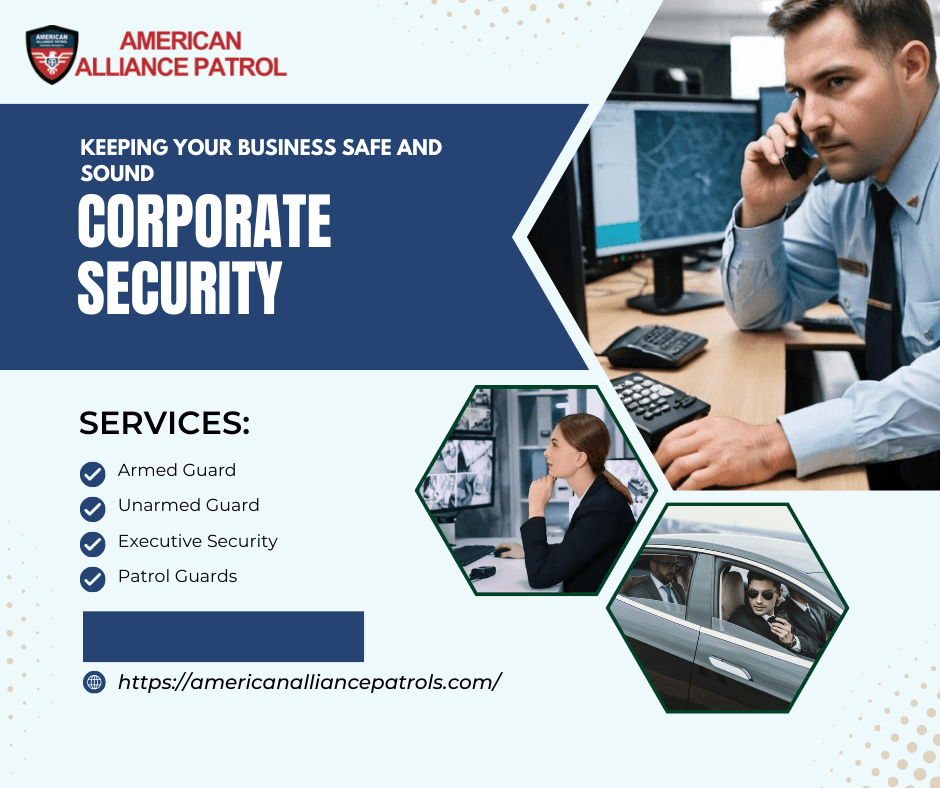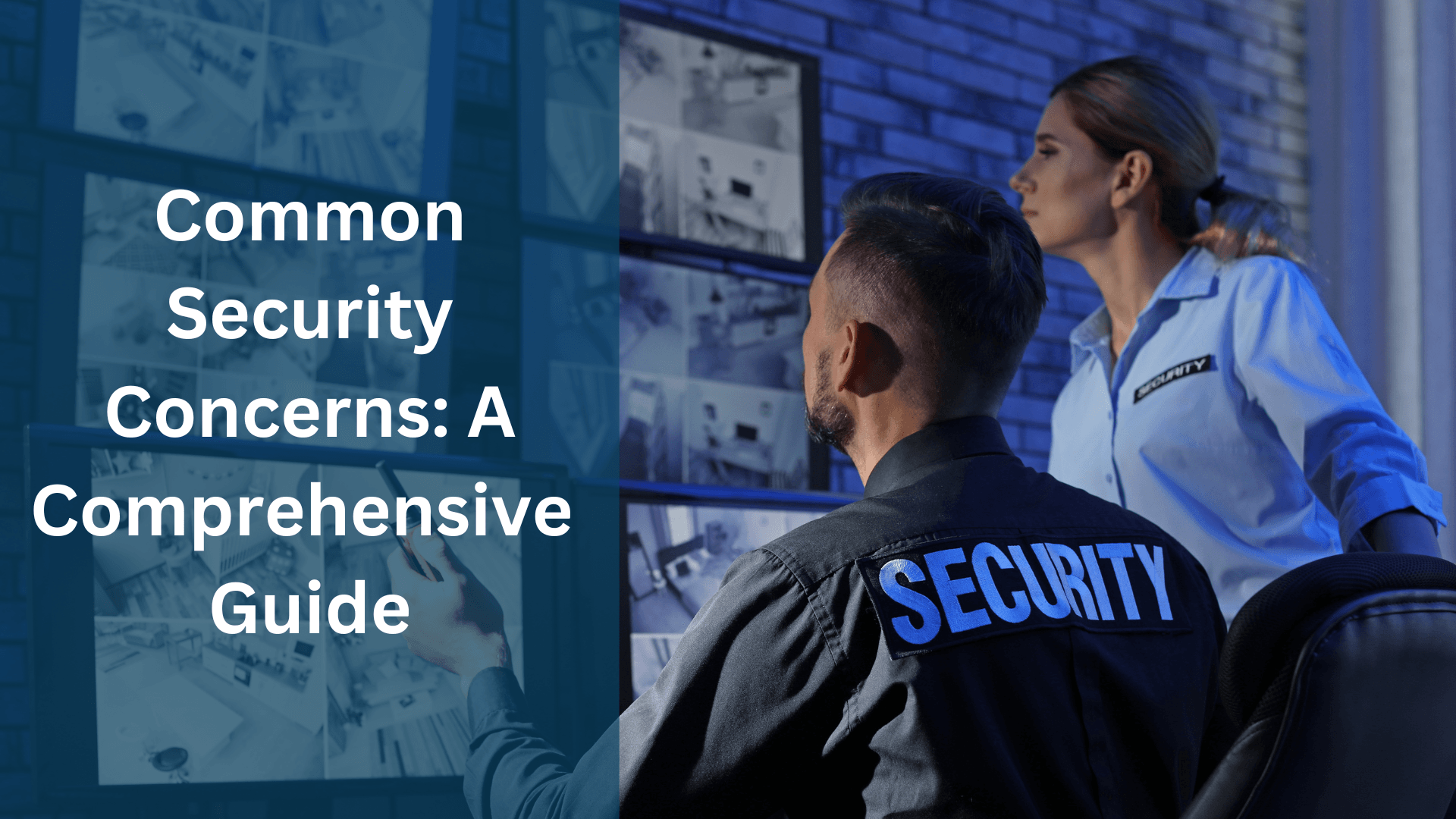Protecting Your Business with American Alliance Patrol Corporate Security Learn about the importance of corporate security and how the American Alliance Patrol can safeguard your business. Discover effective strategies to ensure safety and security in your corporate environment. Work with us Follow Us: Facebook Youtube Instagram Tiktok Pinterest 500px Corporate Security Keeping Your Business Safe and Sound In today’s world, keeping a business safe is more important than ever. Corporate security refers to the measures taken to protect a company’s assets, employees, and information. Whether you run a small shop or a large corporation, understanding corporate security can help you keep your business running smoothly. So, let’s dive in and explore what corporate security is all about! What Is Corporate Security? Corporate security is a term that encompasses all the steps businesses take to protect themselves. It involves protecting not only the physical buildings but also the people and information crucial to a company’s success. Physical Security: This involves securing the physical location of your business, including entrances, exits, and areas that hold valuable assets. Information Security: With so much information stored online, protecting digital data is just as important as guarding the physical building. Personnel Security: This focuses on ensuring that employees are safe while at work and that the hiring processes are secure. Why Is Corporate Security Important? You may wonder, “Why should I care about corporate security?” The answer is simple. When businesses do not take security seriously, they open themselves up to various risks. Here are a few reasons why corporate security is essential: Protects Employees: A safe workplace means happy employees. When workers feel secure, they are more productive and loyal. Prevents Theft: Theft can take many forms, involving physical items or sensitive information. Ensures Compliance: Many industries have regulations requiring specific security measures. Following these regulations can help avoid fines and penalties. Enhances Reputation: A business known for its security measures builds trust with customers and partners. This trust can lead to more business opportunities. Safeguards Data: In an age where data breaches are common, protecting customer and company data is critical. Types of Corporate Security Measures There are several ways to ensure your corporate security is up to par. Here are some of the most common measures businesses can implement: Access Control Systems These systems limit who can enter specific areas of a building. For example, you can use keycards, biometric scanners, or even facial recognition technology to ensure that only authorized personnel can access sensitive areas. Surveillance Cameras Installing security cameras can help deter crime. They not only monitor activity but can also provide evidence in case of an incident. Furthermore, many cameras now have remote access capabilities, allowing business owners to monitor their property in real-time. Security Personnel Having security guards on-site can make a huge difference. They can monitor the premises, assist in emergencies, and provide peace of mind to employees and customers. Additionally, trained security personnel can identify suspicious behavior before a situation escalates. Emergency Preparedness Plans Every business should have a plan in case of an emergency. This can include fire drills, evacuation routes, and protocols for different scenarios like natural disasters or intrusions. Preparing in advance can save lives and protect property. Cybersecurity Measures As we mentioned earlier, protecting digital information is vital. Implementing strong passwords, regular software updates, and firewalls can help keep your data secure. Moreover, training employees about phishing scams and secure online practices is essential. Background Checks Before hiring new employees, it’s wise to conduct background checks. This step helps ensure that the people you are hiring are trustworthy. It’s a simple way to enhance your CS right from the start. Regular Security Audits Regularly reviewing your CS measures helps identify vulnerabilities. Conducting audits can reveal weaknesses you might not have noticed. After all, the more proactive you are, the less likely you are to encounter problems. The Role of Technology in Corporate Community Technology has significantly impacted how businesses approach corporate security. Many companies now rely on advanced tools and software to protect their assets. Here are some technological advancements that have improved corporate security: Smart Surveillance Systems Modern surveillance systems can now use artificial intelligence to detect unusual activities. For example, if someone enters a restricted area, the system can alert security personnel instantly. Cloud-Based Security Solutions Cloud technology allows businesses to store and access data securely from anywhere. This is especially useful for remote work environments, as it ensures employees can access necessary information safely. Incident Reporting Software Using software to report and manage security incidents makes communication easier. Employees can quickly report suspicious activities, and managers can respond faster. Mobile Security Applications Mobile apps can help security teams manage their duties efficiently. For instance, security personnel can use apps to log incidents, check schedules, and communicate with team members. Building a Corporate Security Culture Creating a culture of corporate security starts with leadership. If company leaders prioritize security, employees will follow suit. Here are some tips on building this culture: Training Programs Regular training sessions on security protocols help employees understand their roles in maintaining safety. They should know how to respond to emergencies and recognize potential threats. Open Communication Encouraging employees to speak up about security concerns creates a safer environment. When workers feel comfortable reporting issues, it enhances overall security. Incentives for Good Practices Recognizing employees who follow security protocols can motivate others to do the same. Consider implementing a rewards program for those who report potential threats or suggest improvements. Regular Updates on Security Policies Keeping employees informed about any changes to security policies ensures that everyone is on the same page. Regular updates also demonstrate that the company is committed to safety. Cost… Investing in corporate security can seem expensive, but consider it a necessary expense. When you think about the potential losses from theft, data breaches, or lawsuits, the costs of proper security measures are relatively low. Budgeting for Security Here are some tips for budgeting: Assess Your Needs: Determine what security aspects
Tag: Insider Threats
Common Security Concerns: A Comprehensive Guide
Common Security Concerns: A Comprehensive Guide Discover how to address common security concerns with this comprehensive guide. Learn about physical security, cybersecurity, and more. Introduction to Security Concerns Security is not just about protecting physical assets; it also involves safeguarding people, information, and reputation. Whether you run a small business, manage a large corporation, or oversee an educational institution, security should be a top priority. This guide will help you identify common security concerns and offer practical solutions to address them. Physical Security Concerns Unauthorized Access Unauthorized access is a significant concern for any organization. Whether it’s a trespasser entering your premises or an employee accessing restricted areas, unauthorized access can lead to theft, data breaches, and other security issues. Solution: Implement access control systems, such as keycards, biometric scanners, and security checkpoints, to monitor and restrict entry to sensitive areas. Theft and Vandalism Theft and vandalism can result in significant financial losses and damage to your property. These acts can be perpetrated by outsiders or even by disgruntled employees. Solution: Install surveillance cameras, alarm systems, and hire security personnel to deter potential criminals. Conduct regular audits and inventory checks to minimize the risk of internal theft. Workplace Violence Workplace violence is a growing concern, especially in industries where employees interact with the public. It can range from verbal threats to physical assaults, and it can occur between employees or involve customers. Solution: Train employees on conflict resolution and de-escalation techniques. Establish clear policies and procedures for reporting and addressing workplace violence. Ensure that security personnel are present in high-risk areas. Cybersecurity Concerns Data Breaches Data breaches can have devastating consequences, including financial losses, legal liabilities, and damage to your reputation. Cybercriminals are constantly evolving their tactics to exploit vulnerabilities in your systems. Solution: Implement robust cybersecurity measures, such as firewalls, encryption, and multi-factor authentication. Regularly update software and conduct security audits to identify and address vulnerabilities. Phishing Attacks Phishing attacks involve cybercriminals tricking employees into providing sensitive information, such as login credentials or financial details. These attacks often come in the form of fraudulent emails or messages. Solution: Educate employees about the risks of phishing and how to recognize suspicious emails. Use email filtering tools to reduce the likelihood of phishing emails reaching your inbox. Ransomware Ransomware is a type of malware that locks you out of your systems or encrypts your data until a ransom is paid. This can bring your operations to a halt and result in significant financial losses. Solution: Regularly back up your data and store it in a secure location. Implement endpoint protection software to detect and block ransomware before it can cause harm. Human Resource Concerns Employee Theft Employee theft is a common concern in many organizations. It can involve stealing physical assets, data, or even intellectual property. This type of theft can be challenging to detect and address. Solution: Conduct thorough background checks during the hiring process. Implement strict access controls and monitor employee activity for any signs of suspicious behavior. Employee Negligence Employee negligence, such as failing to follow security protocols or mishandling sensitive information, can lead to security breaches. This is often due to a lack of training or awareness. Solution: Provide regular security training for employees and reinforce the importance of following protocols. Implement clear procedures for handling sensitive information and ensure that all employees are aware of them. Insider Threats Insider threats involve employees who intentionally harm the organization, either for personal gain or out of malice. These threats can be difficult to detect, as the individuals involved often have legitimate access to systems and information. Solution: Monitor employee behavior for signs of potential insider threats. Implement access controls and conduct regular audits to ensure that employees are only accessing information relevant to their roles. Conclusion Security concerns are a reality for every organization, but with the right strategies and measures in place, you can mitigate these risks effectively. By addressing both physical and cybersecurity concerns, as well as human resource and environmental threats, you can create a comprehensive security plan that protects your assets, employees, and reputation. Need help with your security concerns? Contact us at info@247americanalliance.com for expert advice and solutions tailored to your needs. CALL US NOW!


